
“Will you Stand to be counted”? - Dr. Susan Nyaga-Anzuruni
African linguists and educators have been challenged to stand up to be counted in the empowerment of African languages given the negative attitudes that persist with regard to their use in education, governance and development.
Senior Literacy and Education consultant & Director at the Institute for the Development of Languages and Translation in Africa (IDELTA) Dr. Susan Nyaga-Anzuruni contends that Africa cannot attain its development goals in languages mastered by only 10-15% of the African population. Nyaga is also a Research Associate in the Department of General Lingustics, Faculty of Arts and Social Sciences Stellenbosch University in South Africa.
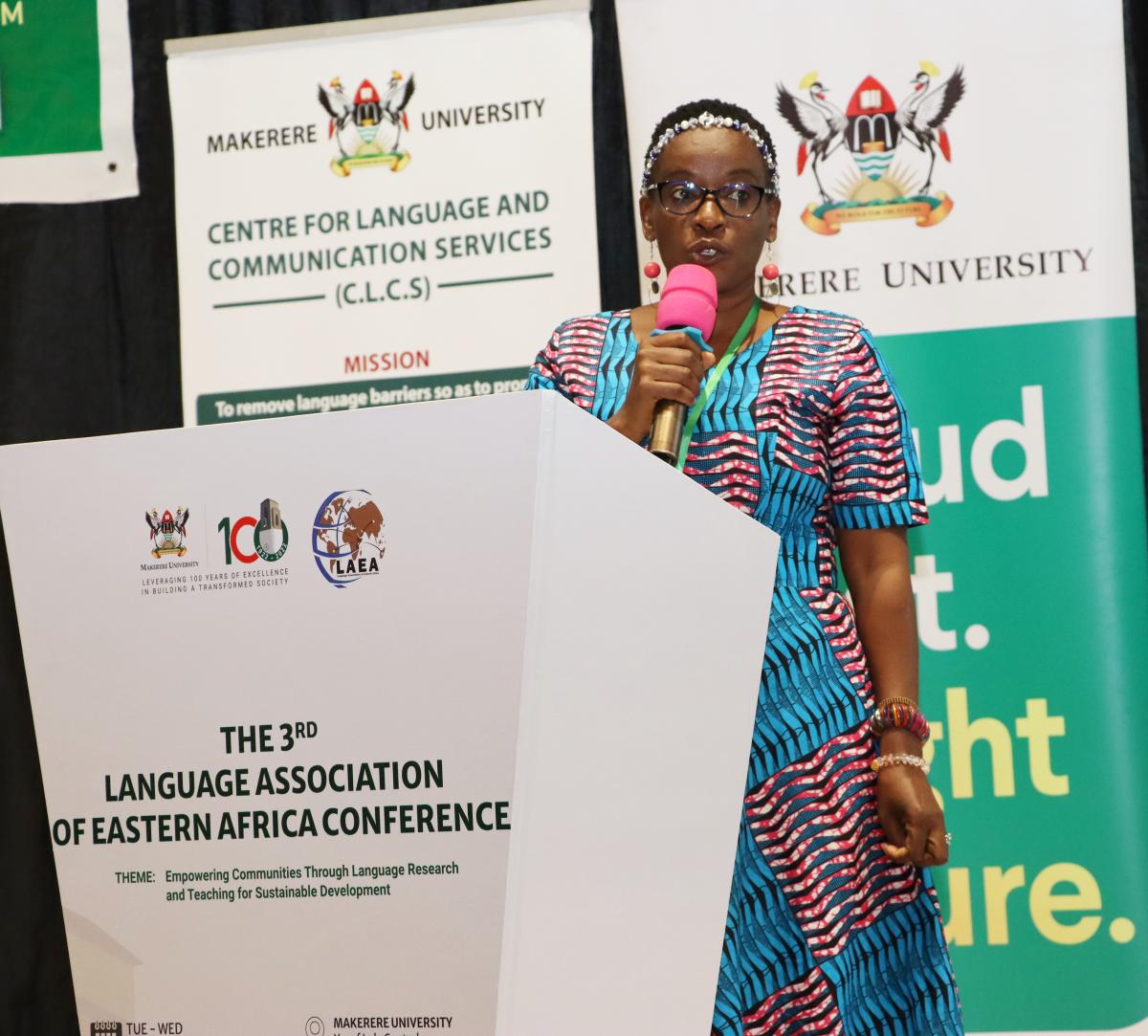 Nyaga- Anzurani was delivering a Keynote Address on: “Comparative issues in mother tongue advocacy in Africa” during the 3rd conference of the Language Association of Eastern Africa (LAEA), held at Makerere University.
Nyaga- Anzurani was delivering a Keynote Address on: “Comparative issues in mother tongue advocacy in Africa” during the 3rd conference of the Language Association of Eastern Africa (LAEA), held at Makerere University.
The conference was organized under the auspices of the Language Association of Eastern Africa (LAEA), with support of the School of Languages, Literature and Communication under the theme , “Empowering communities through Language research and African Linguistics for sustainable development”, held on 15th-16th August 2023 at Makerere University.
She noted that although over 2000 of the world’s languages 930%) are spoken on the African continent, the commonly held view is that certain languages cannot be used to express concepts adequately especially in science and technology.
Nyaga informed the congregation that Across Africa, the idea persists that the international languages of wider communication (ILWCs) (Arabic, English, French, Portuguese and Spanish) are the only means for upward mobility.
She decried that Africa is also the only continent where the entire population has to struggle to make “technological or informational progress through the medium of someone else’s language”
Elaborating the language situation on the African Scene, Nyaga observed that out of 54 countries, indigenous African languages are recognized as official languages in only 10 countries and Arabic in 9 . 46 countries have imported languages as official languages: French in 21 countries, English in 19, Portuguese in 5 and Spanish in 1.
Worse, only 10-15% of the African population are fluent in international languages despite their continued overuse as official languages. This, according to Nyaga means that Africa consumes, sometimes uncritically, information and knowledge produced elsewhere through languages unknown to the majority of its population.
In the education domain, Nyanga said,statistics show that 221 million of school-aged children in the world today are L1 speakers of languages not recognized in the school system. Here, Africa is singled out as the only continent in the world where the majority of children start school using a foreign language.
Of the 2000+ languages spoken in Africa, only 176 languages are used in African education systems and this is mainly in basic education; 25% of these are used in secondary education and a mere 5% in higher education.
Presenting the case for Sub-Saharan Africa, Nyaga said only 3% of SSA’s population of over 800 million people access education through their mother tongues. It is also the case that 22 out of the 39 countries in SSA still use the language of the former colonial entities as Medium of Instruction.
And sadly, no country in SSA uses an African indigenous language for instruction at the university level .
“I challenge African linguists/educators – the African village professors - and anyone who cares about the African continent to stop paying lip-service to the development of African languages and move into action to assure their empowerment and use in the different domains for the development of our beloved continent”, Nyaga asserted.
Nyaga highlighted factors that militate against empowerment of African indigenous languages including the colonial legacy, negative perceptions about multilingualism, language development status and national integration vs linguistic diversity. Other militating factors are modernization and economic development, defective language planning and negative language attitudes .
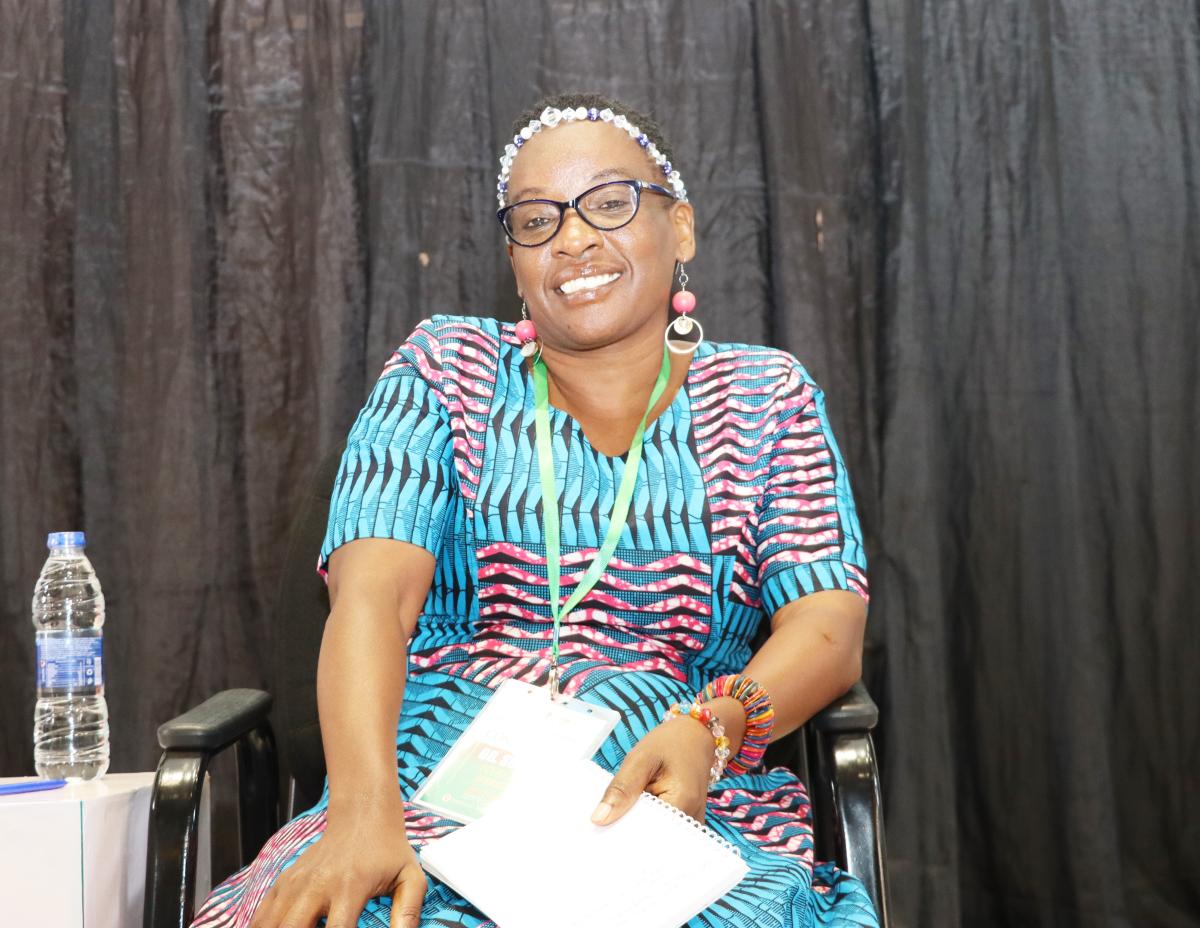 “I call on African linguists/scholars/educators and everyone gathered here today, to awaken their linguistic nationalism and play active roles in the development of African languages while advocating for their use in all domains”, Nyaga implored.
“I call on African linguists/scholars/educators and everyone gathered here today, to awaken their linguistic nationalism and play active roles in the development of African languages while advocating for their use in all domains”, Nyaga implored.
Borrowing from the language garden analogy of Garcia (1992) which points out that the gardener will need to “protect the rare flowers, augment those flowers that are in danger of extinction and control the flowers that spread very fast” (cited in Baker, 1996:40), Nyaga stressed that:
“At no time have African languages needed more augmenting and protection from the spread of ILWCs than in this era of globalization”.
“Advocacy for their use in the various domains in the development of the African continent is one way of protecting and augmenting them”. She concluded and asked: “Will you Stand to be counted?”
Systematic inequalities to be addressed through GoU Mak RIF –DGRT
Representing the Deputy Vice Chancellor in charge of Academic Affairs at Makerere University, Prof. Robert Wamala said the theme of the conference was in line with strategic plan 2021-2025 of the Directorate of Graduate Research and Training
The plan intends to foster and manage graduate training and research by university units by promoting quality research, publication and dissemination of knowledge and innovations to meet the changing needs of society for sustainable development.
“With the emerging discourse of language management and the increasing realization of the strategic role that language plays in multinational and supranational power relations, researchers in Africa should be aiming to understand its diversity of language contexts and grasp how individuals acquire and use these multiple languages,” he said.
Prof. Wamala observed that the problem is that much of the acclaimed published languages and linguistics research is not conducted in the worlds multilingual societies like Eastern Africa but primarily in Northern America and Western Europe.
He noted that studies published in low impact journals where many resource-constrained researchers are located may be less likely to shape the field of language and linguistic research.
“In order to address these identified geographic bias, we in Makerere have gone to the extent of requesting the Government of Uganda to establish the Research and Innovation Fund(RIF). Since 2019, Mak RIF has funded 775 projects across all sectors critical for development in order to address the systemic inequalities in research targeted in this conference”. Prof. Wamala explained.
With LAEA and similar efforts, Wamala advised that the field of language ought to diversify in the years to come to increase the validity of African knowledge in Eastern Africa as well as the contribution of local, national and regional languages.
LAEA focusses on Language policies and enhancing research on understudied languages -President
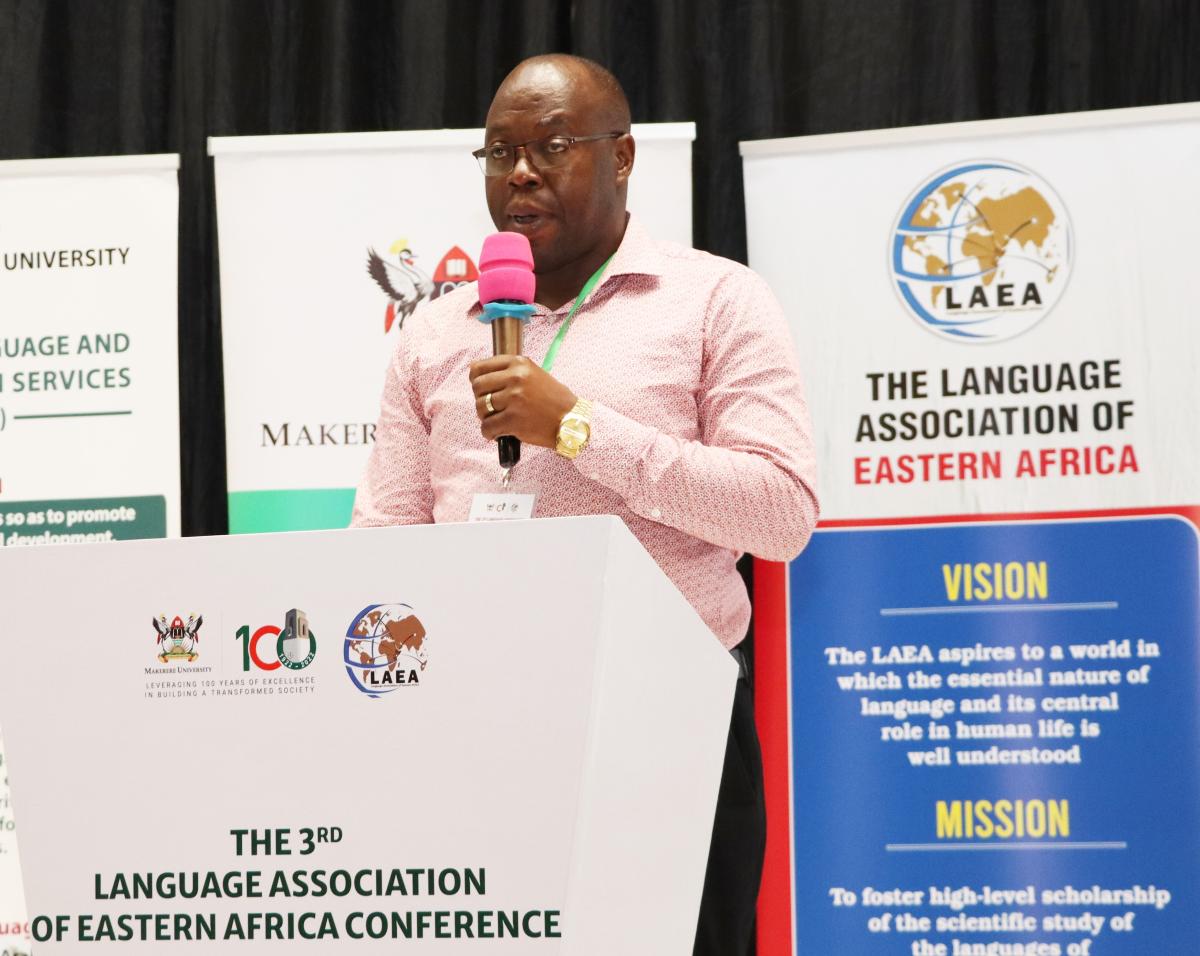 LAEA President Prof. Justine Sikuku welcomed participants to the 3rd conference organize by LAEA describing the association as pretty young.
LAEA President Prof. Justine Sikuku welcomed participants to the 3rd conference organize by LAEA describing the association as pretty young.
“ An idea was conceived in 2017-2018 because we noticed there was a gap in terms of bringing scholars that deal with languages of the Eastern Africa region together. At the beginning the association brought together five countries Kenya Uganda Ethiopia, Zimbabwe and Tanzania with the objective of looking at language policies”,
He said from the meetings held, the association informed the language policies in the different countries today. He added that they kept together mainly to enhance the study of languages and ensure dissemination of research with focus on languages that are understudied.
“But above all, we wanted to establish collaborations and for the few years that we have existed, we are doing well”, Prof. Sikuku said.
The President thanked the conference convener and all partners for successfully organizing and hosting the conference.
Language as an essential scientific tool for societal description, identification, communication and culture- Principal CHUSS
The Principal, College of Humanities and Social Sciences Prof. Josephine Ahikire noted that although Africa is rich in terms of languages, the continent is poor in cashing on them.
“Indeed. with the multilingual diversity that we are endowed with, each death of a language, a deep, wellspring of knowledge is lost,”
She said that the forces reducing African language diversity come from a combination of macro-socio-economic factors and historical events such as colonization and globalization, coupled with local factors such as armed conflicts, population displacements and poorly informed government language policies.
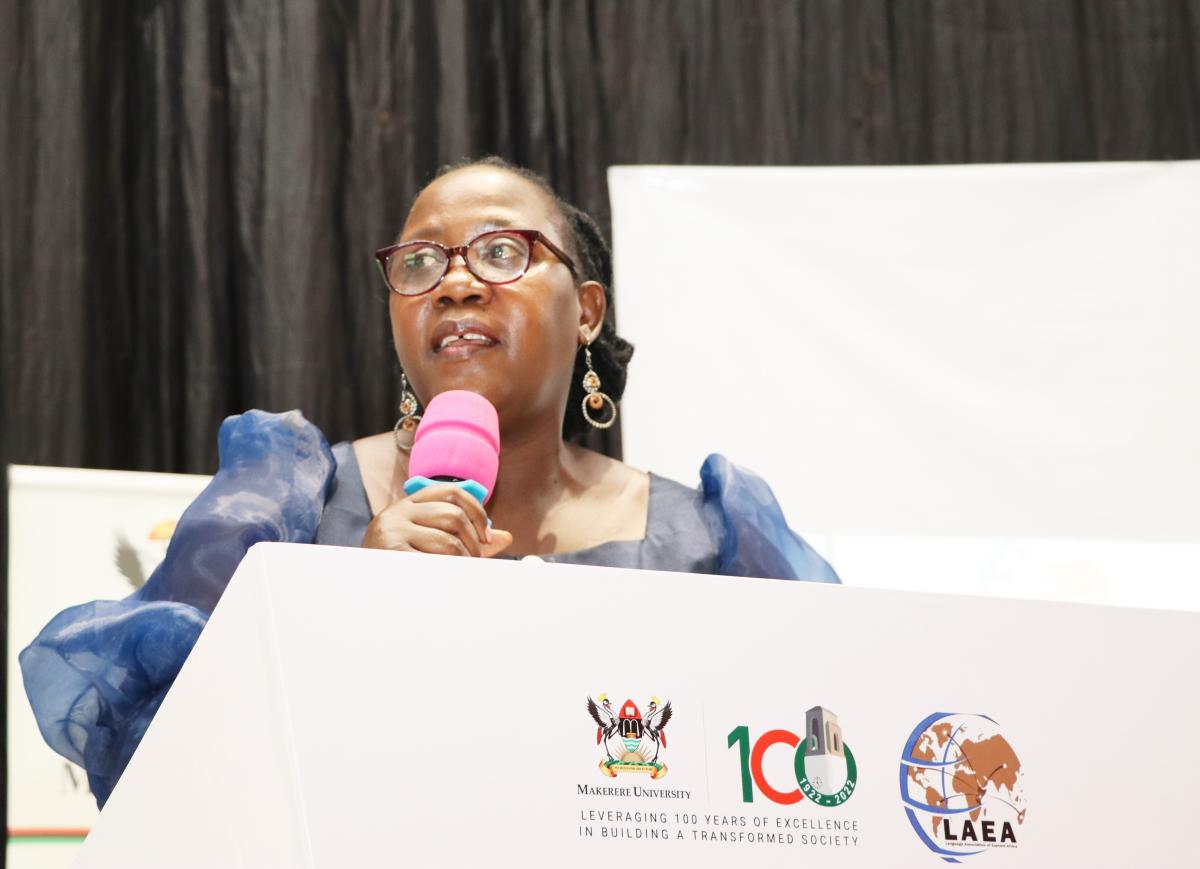 “Let us be proud of our research on our mother tongues; let us add the knowledge of research on English or Mandarin or French or Arabic etc. These will provide information for interventions to revitalize endangered languages and give strength for investing in our multilingual proficiency and communication”, The Principal advised.
“Let us be proud of our research on our mother tongues; let us add the knowledge of research on English or Mandarin or French or Arabic etc. These will provide information for interventions to revitalize endangered languages and give strength for investing in our multilingual proficiency and communication”, The Principal advised.
Apart from being an essential scientific tool for societal description, identification communication and culture, Prof. Ahikire underscored the importance of language in supporting social cohesion and use for respect for established values and specific purposes such as forensic languages an implementation of strategic actions aimed at sustainable development.
“Just like Chinua Achebe proclaimed, it is not necessary for black people to invent a great fictitious past in order to justify their human existence and dignity today. What they must do is recover what belongs to them-their story-and tell it themselves”, Ahikire stated.
The conference poses a challenge to academic researchers and professional practitioners- Dean School of Languages, Literature and Communication
The Dean School of Languages, Literature and Communication Assoc. Prof. Saudah Namyalo pointed out that the conference theme poses a challenge to academic researchers and professional practitioners, a questioning of the local and global positioning and relevance of language research and African linguistics.
Dr. Namyalo reported that apart from a few and sparsely located African linguistic researchers, North America and Western Europe are primary locations of research on indigenous national and regional languages.
“And yet, with development being based on communication through language, and more than 2000 languages being used in Africa, language should be a highly relevant factor in all sectors of political, social, cultural and economic life”, Namyalo explained.
She said the LAEA conference 2023 discussed the resourcefulness of languages both local and global and analyses the growth of linguistic research areas in view of the ongoing transformation of African societies and how much it relates to economic development whether in terms of education, planning, information technology, legal application or language science.
The conference according to Dr. Namyalo offers an opportunity of Africans to face squarely Africa’s essential ethnolinguistic plurality and diversity challenges in view of the continent’s ongoing economic development and the accompanying social cultural transformation.
About LAEA 3 conference objectives- Convener
The Conference Convener and also head Department of European and Oriental Languages Prof. Edith Natukunda-Togboa said the conference addresses a set of related questions based on a novel Applied African Sociolinguistics approach by taking a critical stand on current mainstream development discourse.
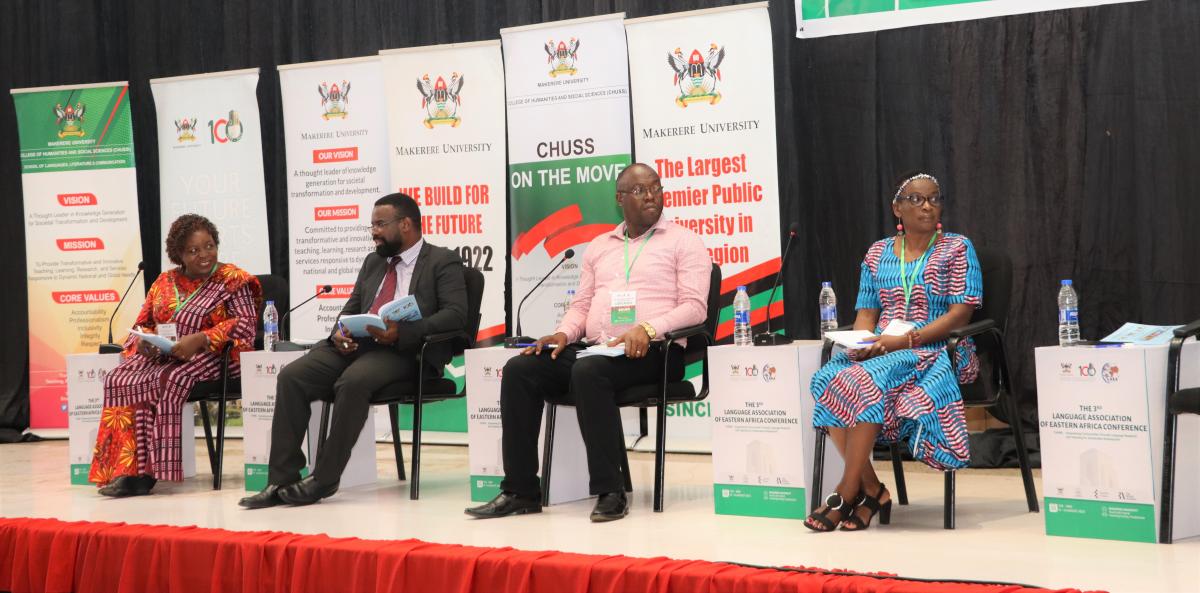 In the recent past, Prof. Natukunda observed that this discourse has tended to be monopolized by the social sciences and economics adding that LAEA conference gives them an opportunity to claim their space in the social sciences and humanities research.
In the recent past, Prof. Natukunda observed that this discourse has tended to be monopolized by the social sciences and economics adding that LAEA conference gives them an opportunity to claim their space in the social sciences and humanities research.
“The conference combines discourse analysis with relevant scientific and sociolinguistic facts and challenges for comprehensive language planning in the face of the ongoing transformations in society and the need for technological and economic advancement”.
“The emphasis is put on the role of language in education, at the workplace, in information technology and society at large”, She explained.
The conference according to the convener was organized according to a set of five tracks; discourse analysis and forensic linguistics, morphology and syntax, sociolinguistics, phonology and lastly language policy, planning and education. A parallel sixth track was added for early career scholars to include a writing workshop.
She said the conference carried objective views on matters relating to experiences of language researchers and university lecturers in several Eastern Africa. It combines personal experience with a multiplicity of professional academic dealings with African linguistics, sociolinguistics and interdisciplinary discourse analysis.
“It represents a balancing act between reporting empirical objective facts culled from scientific research and subjective interpretation of both empirical facts and pedagogical class observation.”.
She added that the conference also allows for some language advocacy which reflects the respective authors ‘support for national, and regional linguistic and cultural plurality and diversity, which is a born of deep contemporary concern to respect people’s right to optimally use their languages for deliberating language and linguistic related matters that affect the development of the African continent.
